Understanding Dural AVF Embolization in Neuro Intervention
Introduction
Dural Arteriovenous Fistulae (DAVF) are abnormal connections between arteries and veins within the dura mater, the outermost layer of the brain’s protective covering. These fistulae can disrupt normal blood flow and lead to serious neurological complications if left untreated. In this blog post, we will delve into the process of Dural AVF Embolization in Neuro Intervention, focusing on its procedure, benefits, and potential risks.
What is Dural AVF?
Dural AVF is a rare vascular malformation that occurs in the brain or spinal cord. It involves an abnormal connection between arteries and veins in the dura mater. This connection disrupts the normal flow of blood and can lead to symptoms such as headache, pulsatile tinnitus, visual disturbances, and neurological deficits.
Embolization Procedure
Embolization is a minimally invasive procedure used to treat Dural AVF. During the procedure, a catheter is guided through the arteries to the site of the fistula. Once the catheter is in place, the neurointerventional radiologist injects a special glue-like substance or coils into the abnormal connection. This blocks the blood flow through the fistula, causing it to shrink and eventually close off.
Benefits of Embolization
Embolization offers several benefits as a treatment for Dural AVF. It is minimally invasive, meaning it does not require open surgery and is associated with shorter recovery times. Additionally, embolization is highly effective, with a high rate of fistula closure and symptom resolution.
Risks and Complications
While embolization is generally safe, there are risks associated with the procedure. These include bleeding, infection, allergic reactions to the embolization material, and stroke. The risk of complications is higher in patients with complex Dural AVF or underlying health conditions.
Conclusion
Dural AVF embolization is a safe and effective treatment for Dural AVF, offering a minimally invasive alternative to open surgery. By blocking the abnormal connection between arteries and veins, embolization can improve symptoms and prevent serious neurological complications. If you or a loved one is diagnosed with Dural AVF, consult with a neuro interventional radiologist to discuss the best treatment options available.
Our Doctors
Dedicated IR Center for Vascular Problems in Madhya Pradesh
DR. SHAILESH GUPTA
MD, PDCC (INTERVENTIONAL RADIOLOGY) Consultant & Co-Director CVIC (Center Of Vascular & Interventional Care)
DR. ALOK KUMAR UDIYA
MD Radiology, PDCC (Neuro intervention Radiology), PDCC ( HPB Intervention Radiology) FINR (Switzerland) & EBIR
Endovascular Surgeon & Consultant Interventional Neuroradiologist at Care CHL Hospital, Indore Co-director CVIC( center for vascular and interventional care) https://interventionradiologyindore.com/
DR. NISHANT BHARGAVA
Consultant Intervention Radiologist
MD Radiology, PDCC ( Neuro intervention Radiology), FINR ( Fellowship in Neuro intervention Radiology)
Co-director CVIC(Center for Vascular and Interventional Care)
Contact Details
Phone no.
0731 4675670
+91 9827760073
Facebook
https://www.facebook.com/profile.php?id=100092538633553&mibextid=ZbWKwL
Instagram
https://instagram.com/cvic_center?igshid=ZGUzMzM3NWJiOQ==
Google My business
https://g.co/kgs/DrdV3T
YouTube
https://www.youtube.com/channel/UCP5TH5e4iQZkpDUgnLsgZhw
Pinterest
https://pin.it/5DzpX5Z
Twitter
https://x.com/cviccenter?t=01TclSrLFdu0K2re0Gs96w&s=08
LINKEDIN
https://www.linkedin.com/company/center-of-vascular-interventional-care/
Location –
Read More –
Carotid Stenting in Neuro Intervention – https://cvicvascular.com/carotid-stenting-in-neuro-intervention/
Radiology Services Indore – https://cvicvascular.com/radiology-services-indore/
Pre-operative Embolisation of Tumor in Neuro Intervention – https://cvicvascular.com/pre-operative-embolisation-of-tumor/




